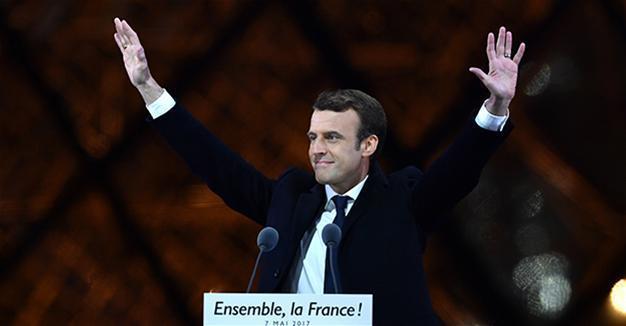Macron marches to French presidency
PARIS

AA photo
Emmanuel Macron has won a resounding victory in the French presidential election but the focus shifted immediately on May 8 to whether he can govern the country without the support of a traditional party.At 39, the pro-EU former investment banker will become France’s youngest-ever president after crushing far-right leader Marine Le Pen in the run-off on May 7, but he faces a formidable challenge to enact his policy program while trying to unite a fractured and demoralized country.
He has proposed an ambitious domestic reform agenda including cutting state spending, easing labor laws, boosting education in deprived areas and extending new protections to the self-employed.
But he is inexperienced, has no political party and must fashion a working parliamentary majority after legislative elections next month.
There is skepticism about Macron’s ability to win a majority with candidates from his En Marche movement -- “neither of the left, nor right” -- alone, meaning he might have to form a coalition.
“In order for us to act, we will need a majority in the National Assembly,” En Marche secretary general Richard Ferrand told TF1 television, adding that only “half of the journey” had been completed.
And his economic agenda, particularly plans to relax labor regulations to fight stubbornly high unemployment, is likely to face fierce resistance from leftist opponents.
He also inherits a country still in a state of emergency following a string of Islamist-inspired attacks since 2015 that have killed more than 230 people.
“I know the divisions in our nation, which have led some to vote for the extremes. I respect them,” Macron said in an address at his campaign headquarters, shown live on television.
“I will work to recreate the link between Europe and its peoples, between Europe and citizens,” he said.
Macron won 66.1 percent of the vote against 33.9 percent for Le Pen, final results from the interior ministry showed on May 8.
Macron received a total of 20,753,797 votes, compared with 10,644,118 for Marine Le Pen, the interior ministry announced the day after the landmark election.
The abstention rate was 25.44 percent, the highest since the presidential election in 1969.
The interior ministry on May 7 reported a record number of blank and invalid ballots, accounting for nine percent of all registered voters, compared with two percent in the first round.
Together with the abstention rate, that means that one in three voters declined to choose between the two candidates.
Western leaders largely hailed the result after the shock of Britain’s vote to leave the EU and the election of Donald Trump in the United States.
Macron reached out to Le Pen’s supporters in a plea for unity after a vicious election campaign that exposed deep economic and social divisions, as well as tensions provoked by identity and immigration.
“They voted out of anger, distress and sometimes conviction. I respect them,” he said. “I will do everything I can over the next five years to ensure that people no longer have any reason to vote for extremes,” he said.
According to a poll on May 8, En Marche will receive between 24 and 26 percent of votes in legislative elections, with the Republicans party on 22 percent, the National Front 21-22 percent, the far-left France Insoumise (France Unbowed) 13 -15 percent and the Socialist Party 8-9 percent.
Macron walked on to the stage to the strains of “Ode to Joy,” the anthem of the beleaguered European Union that he has promised to strengthen after Britain’s impending exit.
His 64-year-old wife Brigitte joined him on stage with her children and grandchildren.
“He’s a symbol of hope,” said Jean-Luc Songtia, a 36-year-old driver. “It’s like Obama eight years ago. It’s youth, it’s hope.”
Unknown three years ago, Macron is poised to become one of Europe’s most powerful leaders and the result will resonate worldwide, particularly in Brussels and Berlin where leaders will breathe a sigh of relief at the defeat of Le Pen’s anti-EU, anti-globalization program.
German Chancellor Angela Merkel’s spokesman said it was a “victory for a strong and united Europe” and the two had a “very warm” telephone call after his victory was announced, Macron’s team said.
British Prime Minister Theresa May discussed Brexit with Macron in a call to congratulate him late May 7, her office said.
Trump, whose beliefs are seen as radically different to Macron’s, tweeted congratulations on a “big win” and said he looked forward to working with him.
The French election had been widely watched as a test of how high a tide of right-wing nationalism would rise after Brexit and Trump.
Le Pen, 48, had portrayed the election as a contest between Macron and “globalists” -- those in favor of open trade, immigration and shared sovereignty -- and her “patriotic” vision of strong borders and national identities.
In a short speech to supporters, Le Pen claimed a “historic, massive result” and said she had called Macron to wish him success in tackling the country’s challenges.
She said her party needed to undergo a “profound transformation” ahead of parliamentary elections in June. One of her aides said the party will change its name.
















